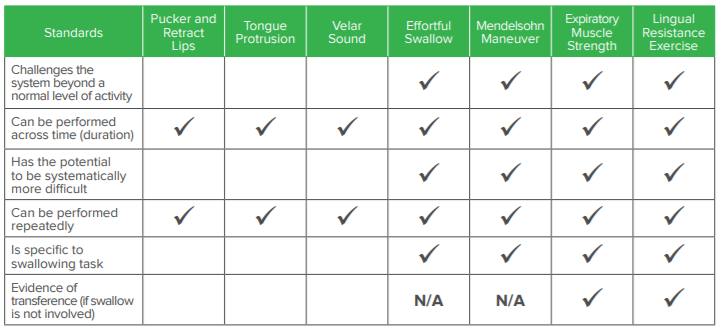This is the third and final installment of our “Exercise in Swallowing Therapy” series. This article will examine some commonly used interventions in light of exercise principles. But first, a quick review. In order to be considered an exercise the activity must meet certain criteria (for more information refer to the two previous articles). A few basic requirements are:
1. Exercises must challenge the system beyond normal levels of activity.
2. The activity must be performed with adequate duration for the system to realize there is a need for change.
3. In order to make continued gains, the exercise load must be systematically and progressively increased.
4. Repetitions matter.
5. The neuroplastic principles of specificity to task and transference generally yield increased outcomes for any interventions.
Good concepts, but how can this be translated into clinical practice? Let’s look at a few common therapy interventions and see how they meet the standard:1-5

Realize an exercise program specific to the patient’s impairment is most likely to yield positive results. Just because an exercise may be proven to have beneficial effects on swallowing behavior does not mean every patient should perform that intervention.
References:
1. Burkhead, L. M., Sapienza, C. M., & Rosenbek, J. C. (2007). Strength-training exercise in dysphagia rehabilitation: principles, procedures, and directions for future research. Dysphagia, 22(3), 251-265.
2. Hind, J. A., Nicosia, M. A., Roecker, E. B., Carnes, M. L., & Robbins, J. (2001). Comparison of effortful and noneffortful swallows in healthy middle-aged and older adults. Archives of physical medicine and rehabilitation, 82(12), 1661-1665.
3. McCullough G. (2014) One step back and two steps up and forward: The superior movements of research defining the utility of the Mendlesohn maneuver for improving UES function. Perspectives on Swallowing and Swallowing Disorders (Dysphagia). Vol 23, No 1.
4. Robbins, J., Kays, S. A., Gangnon, R. E., Hind, J. A., Hewitt, A. L., Gentry, L. R., & Taylor, A. J. (2007). The effects of lingual exercise in stroke patients with dysphagia. Archives of physical medicine and rehabilitation, 88(2), 150-158.
5. Sapienza, C. M., & Wheeler, K. (2006). Respiratory Muscle Strength Training: Functional Outcomes versus Plasticity. Seminars in Speech and Language. 27, 236- 244.
